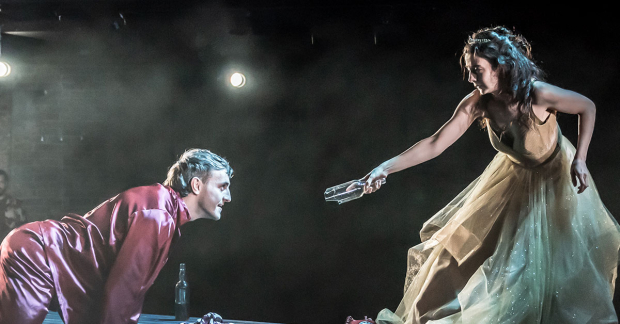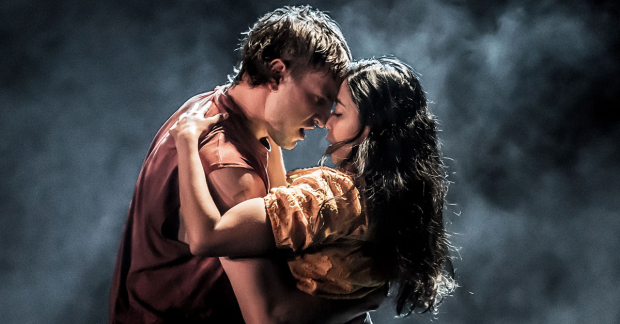Review: Paul Mescal and Patsy Ferran in London A Streetcar Named Desire

(© Marc Brenner )
A bit of history. Five years ago, director Rebecca Frecknall and performer Patsy Ferran catapulted themselves to the forefront of the London theater scene with their revival of Tennessee Williams's Summer and Smoke, a pared-back, piano-laden production that found the music beneath Williams's romantic torment. The show transferred into the West End, picking up Olivier Awards aplenty and pushing both on to further success: Frecknall directed the record-breaking Eddie Redmayne Cabaret, while Ferran had been co-starring in Who's Afraid of Virginia Woolf? on Broadway, which became a Covid casualty.
Now, they're back at their north London stomping ground, the Almeida Theatre, for the third time (a less assured Three Sisters came in 2019), once more tackling Williams in a captivating, if slightly uneven staging of A Streetcar Named Desire.
The reunion wasn't the original plan. Alongside star draw and Normal People/Aftersun breakout performer Paul Mescal as Stanley, Lydia Wilson had been set to lead the show as Blanche, but dropped out due to injury late last month. It meant Ferran only had a week to prepare and started the run with script in hand.
You'd not have known it judging from her performance here. Reading younger than some recent Blanches, including the unforgettable Gillian Anderson, Ferran adeptly bounces between temerity and skittishness, erratic without ever being irritable. It's a confident turn, seeking novelty while also feeling truthful to the real-life experiences of Williams's beloved sister Rose, plagued by mental health issues and lobotomized in her early 30s. An enthralling blend of the contemporary understanding of mental health is deftly layered onto a malleable classic text.
This can also be seen in Frecknall's directorial choices. In Act 2, as Blanche's emotional wellbeing decays due to the taunts from her brutish brother-in-law, Stanley (more on him later), she seems to drag the sparse stage's furniture into a corner and builds herself a nest. Seeing as the death of a loved one (such as the suicide of a young husband, in Blanche's case) can be a trigger for hoarding, this works neatly. Other choices are, while less subtle, equally successful: drummer Tom Penn, perched above the stage, accompanies the show like an erratic heartbeat, thunderclaps and whispered cymbals.
As has been the case for all of Frecknall's productions at the Almeida, the space is defined by absence over presence. In Summer and Smoke there were no real set or costume changes; in Three Sisters there was a piano without a piano player. Here, again, a sparse dais is all that occupies the in-the-round Almeida configuration. Offstage cast members, silently floating around the auditorium, seem to be in search of some wings.

(© Marc Brenner )
Frecknall's vision for Stanley feels less specific. Young, constantly smiling, wildly violent and wily, Mescal gives a captivating performance, especially in conjuring a caustic, visceral relationship with Anjana Vasan's Stella. But the underpinnings for his choices feel less cohesive.
Stanley is clearly also the youngest of the main trio, and Frecknall revels in questions of age. Rather than creating a clear gap of years between Stella and Blanche, as was seen in the Anderson revival, here the sisters seem almost like distorted reflections of one another. Vasan's Stella, lustful, settled and on the brink of motherhood, suggests an alternate reality Blanche (whose only output for carnal desires was to sleep with strangers and earn a disreputable name for herself) could have achieved, had the tragic end to her marriage not occurred.
When Ferran's Blanche patronizingly addresses her younger sister with the moniker "Stella for star" when they first reunite, it seems more like a knee-jerk attempt to assert some sort of dominance over the other, rather than to inject a real sense of sororal love. This twist also makes the heartbreak when Mitch (a superb turn by Dwayne Walcott) rejects Blanche and robs her of a final opportunity for happiness.
It all still gels neatly in places. Blanche's sparkling yellow gown as she is confronted by Stanley while he awaits the birth of his child feels like a chilling distortion of a Beauty and the Beast fairytale, mythic romances transformed into chilling confrontations. Other times, the costumes feel like a Gen-Z's Coachella fever dream: bottle green trousers, clashing knitwear patterns, and wavy garments abound. An Elysian Fields vintage sale must have yielded some fruitful results.
With a text like Streetcar at her disposal, Frecknall and her team have the luxury of throwing a lot at those porous New Orleans walls and seeing what sticks. A slow-motion jostling sequence at the close of the play leans slightly into excessive mess, for instance. Thankfully, lots here does stick, helped along by some unwavering central performances.










